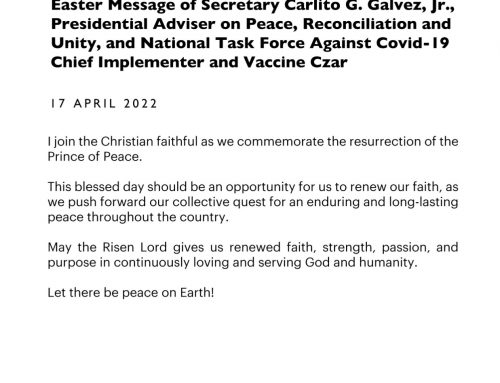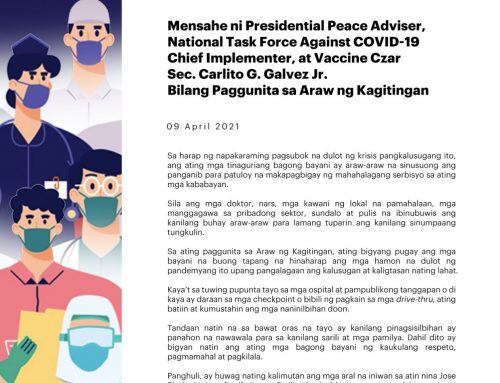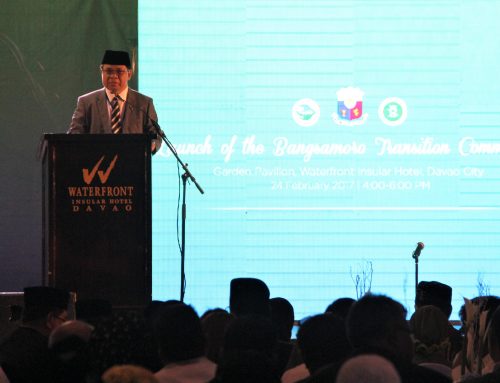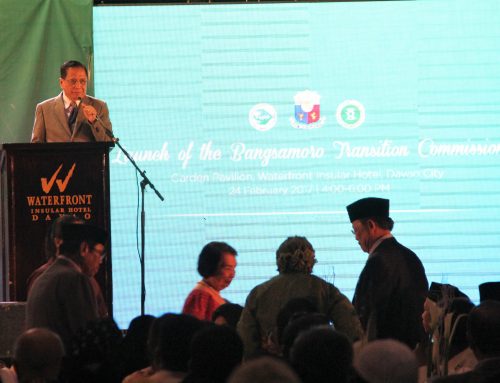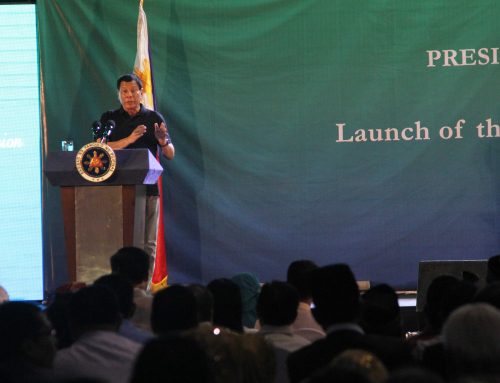
Undersecretary Nabil Tan delivered the speech in behalf of Sec. Jesus Dureza at the opening of the National Peacebuilding Conversations in Royal Mandaya Hotel, Davao City.
To representatives of national government agencies, regional line agencies, local government units, civil society organizations, and our partners for peace and development:
Good afternoon. Maayong hapon sa tanan. As-salāmu ʿalaykum!
On behalf of our Presidential Adviser on the Peace Process Jesus G. Dureza, we express our gratitude to you – our partners for change and instruments for peace. Your presence today speaks of our shared and continued engagement in pursuing peace and development across our homeland.
We all know that permanent peace is one of the priority agenda of the administration of President Rodrigo Roa Duterte. He has never wavered in his intent to put a permanent end to all armed conflicts in the land. His firm commitment to this aspiration is embodied in his administration’s Six Point Peace and Development Roadmap – which he approved as early as his 18th day in office.
Now, more than 100 days therefrom, our administration has achieved unprecedented strides in the peace process. All peace tables are moving onward with the optimistic outlook that just and permanent peace in the land is not only possible, but definitely achievable. However, this does not make us complacent -not for one second – as we bolster our hard work with much-needed sustainability. We hit the ground running instituting sustainable reforms, slowly but surely.
Equally important to his directive to end armed conflicts, President Duterte aspires for each and every Filipino to live in contentment and security – a form of security that goes beyond the absence of war…security that goes hand in hand with the provision of sustainable livelihood, access to basic human needs, and enjoyment of individual freedoms.
This is why certain thematic clusters in our Cabinet previously held development summits to operationalize the President’s goal of a people-centered security. First, our President’s economic team organized “Sulong Pilipinas” last June 20 to 21 and met with stakeholders from economic and business sectors in order to flesh out the administration’s 10-point economic agenda. Second, Cabinet Secretary Jun Evasco spearheaded the Social Development Initiatives Summit last August 17 to 18 along with various sectors to tackle the government’s anti-poverty program. Ultimately owing to the commitment of all summit participants, they were able to craft the 10-point social development agenda.
Our National Peacebuilding Conversation is therefore a spin-off of these two previous initiatives and part of the continuing dialogue between our government and our constituency in forging plans of actions in each thematic cluster. Today, we are given our part to enumerate what needs to be done in realizing the President’s aspiration in peace and development.
The cornerstone of our roadmap for peace and development is the people’s participation. More vital than the peace tables we are currently in dialogue with, we seek to engage the bigger and wider peace table – the “peace table of the Filipino people”. We wish to jumpstart the more fundamental dialogue of nation-building through a true and lasting peace.
We are given the opportunity to take part in the painstaking yet uniquely rewarding process of peacebuilding – perhaps the most essential in our nation’s history. In a process as historically significant as this, we do not want to commit the mistake of leaving anyone, any sector, group, any Filipino behind. We call on everyone to get on board and participate in their own small but meaningful way. We want to initiate public conversations with different stakeholders. We may not all obtain the opportunity to sit at the negotiating tables, but we can be in the sidelines: pitching our ideas, sharing our concerns in the best constructive and democratic tradition.
This is the essence of our President’s comprehensive approach and vow to make the peace process genuinely inclusive to all citizens.
In a process as complex and multilayered as peacebuilding, we need the nation as a community – “the bigger table,” so to speak – to help us in identifying the problems and brainstorming solutions. The 20-item agenda we shall discuss for the duration of this summit is evidence enough of how multi-faceted the issue truly is. These items comprise the concerns of each stakeholder, the processes included in the peace continuum, and all work areas we are continuously pursuing. It is our hope that the summit brings to the fore a deeper understanding of issues, an assessment of our previous actions, and a learning curve to our shortcomings and excesses. This hopefully yields the “nuts-and-bolts” or blueprint for how to ensure the success of our six-point peace and development roadmap.
Our discussions are also useful avenues with which to strengthen our long-time partnership. As Secretary Dureza previously said, working for peace is both a commitment of our government and our people. It is through this cooperation that we own the peace process as one that is forged by the people, of the people, and for the people.
Whatever role you play, wherever you may sit at this very moment, you are an essential part of this summit.
We need you here: to represent the people from your community, and in turn, when you go back to your communities, to represent us. You echo the concerns of our marginalized and underprivileged sectors, in the same way that you cascade our messages to the communities war-torn and scarred as they are by long-standing conflicts.
We still have a long, arduous way to go. We hope that we enrich our partnership more meaningfully to respond to the challenges ahead. Whatever we have agreed upon serves our pledges to continue our commitments to make our communities turn into productive units free from armed conflicts and actively contributing to national progress and social transformation.
We are looking forward to fruitful conversations with you. Again, we are grateful for your participation in this summit.
Thank you and isang pagbati ng kapayapaan sa lahat!


